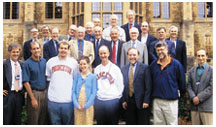| Web Exclusives: TigersRoar |
Various letters touching
on the topic of the Rhodes Scholar program
Related topic: The African Scholars' Fund
Several alert readers of PAW have pointed out to me a letter in your Nov. 19 issue in which I am referred to as a "courageous hero" for having announced in a tense meeting 30 years ago that I would no longer accept Department of Defense funding for research then being carried out in Princeton's Physics Department (see the letter from Larry Campbell '70 in the Nov. 19 issue).
I am certainly uneasy about being described as a "hero," whether courageous or not. But I am very pleased indeed that my act of a third of a century ago is remembered by some present at the University then.
I take particular pleasure in Larry Campbell's observation that what I did was in the nation's service. He makes an important point: One does not have to be Secretary of Defense, or Majority Leader of the Senate, or for that matter even in agreement with prevailing government policies, in order to join the long and honorable tradition of Princetonians acting in the nation's service.
Bruce Partridge '62
Haverford, Pa.
Respond
to this letter
Send
a letter to PAW
In tbe November 19 issue, Larry Campbell '70 told a story about Bruce Partridge '62 and said he wondered what had become of this "brave Princetonian."
As a Haverford College alum, I am pleased to report that Bruce Partridge is a professor of astronomy at Haverford and has previously served both as provost and as dean of the college.
he story Mr. Campbell told shows that Dr. Partridge was upholding Haverford's Quaker ideals long before he became a valued member of our faculty.
Jill M. Emmert
Haverford College
Haverford, Pa.
Respond
to this letter
Send
a letter to PAW
 |
| Former Rhodes Scholars gathered in Oxford for four days in early July to celebrate the centennial of the Rhodes Trust. More than 100 Princeton students have received Rhodes Scholarships, and 23 attended the festivities. They were: left to right (front) Scott Rafferty ’76, Mike McCaffery ’75, Trevor Leitch ’02, Kate Buzicky ’02, Richard Balfour ’71, Nicholas Ulanov ’78, Mark Janis ’69, and Randy Weinberg ’74; (middle) Tim Gokey ’83, Will Hunter ’77, Morton Kahan ’64, Peter Paine ’57, Sam Holt ’58, Lewis Mudge ’51, Joe Nye ’58, Paul Sarbanes ’54, Jim Hester ’46, David Mehnert ’87, Bruce Partridge ’62 and John Alexander ’67; (back) Larry Grisham (Princeton research physicist), Bob Rawson ’66; and Marc Lackritz ’68. |
Synchronicity has moved me to write this letter. Yesterday I was telling the story of a hero from Princeton; today I see his photo in the Alumni Weekly with a group of former Rhodes Scholars. When I was a senior a proud moment in Princeton’s history occurred with the University going on strike in response to the secret bombing of Cambodia. A University-wide debate ensued regarding the “neutrality of science.”
During that debate it was pointed out that agent orange had been developed at Princeton by a chemist who developed it to help with harvesting peaches, synchronizing ripening by defoliating the orchard. The use of this chemical cocktail as a weapon was beyond the scientist’s control, but he was working under a grant from the military.
Much thoughtful exchange occurred during the debate, but it eventually devolved into simply an academic exercise when it was finally announced that science is neutral and Princeton would not refuse grants from the military even during a regime that secretly waged war.
It was then that a very courageous hero stood up and announced that even though he could see no way the results of his Navy sponsored grant to study the edges of the universe with a radio telescope could be used to wage war he would, nevertheless, give up his grant. To this day I occasionally relate my admiration for that rare kind of individual heroism by telling this story of Professor Bruce Partridge.
I have often wondered what became of this brave Princetonian whose courageous act was in the nation’s service.
Larry Campbell ‘70
Darby, Montana
Respond
to this letter
Send
a letter to PAW
January 29, 2002
I was fascinated to read that Lillian Pierce ’02, was awarded the
Rhodes Scholarship, just as her brother Niles ’93 had during his
senior year. Is this a first for the Rhodes Scholarship program, or have
other siblings won them? And in a future PAW, could you provide more details
of her pre-Princeton homeschooling? I am amazed and awed by her achievements!
Victoria McElhaney Benedict ’91
Atlanta, Ga.
Respond
to this letter
Send
a letter to PAW
Go back to our online Letter Box Table of Contents
HOME
![]() SITE
MAP
SITE
MAP
Current
Issue ![]() Online
Archives
Online
Archives ![]() Printed
Issue Archives
Printed
Issue Archives
Advertising Info ![]() Reader
Services
Reader
Services ![]() Search
Search
![]() Contact
PAW
Contact
PAW ![]() Your
Class Secretary
Your
Class Secretary
